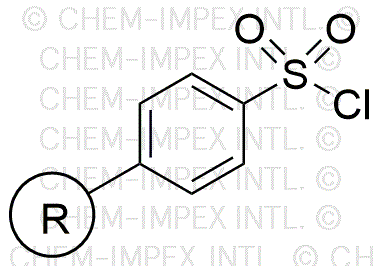Sulfonyl chloride resin is widely utilized in research focused on:
- Organic Synthesis: This resin serves as an effective reagent for the synthesis of sulfonamides, which are important in pharmaceuticals. Its high reactivity allows for efficient coupling reactions, streamlining the development of new drug compounds.
- Solid-Phase Peptide Synthesis: In peptide synthesis, the resin acts as a solid support, facilitating the stepwise assembly of amino acids. This method enhances purity and yield, making it a preferred choice for researchers in biochemistry.
- Environmental Applications: The resin can be used in the removal of heavy metals from wastewater. Its functional groups bind to contaminants, enabling effective water treatment solutions in industrial settings.
- Catalysis: It can function as a catalyst in various chemical reactions, providing an efficient pathway for transformations that are crucial in chemical manufacturing processes.
- Polymer Chemistry: The resin is utilized in the development of specialty polymers with tailored properties, making it valuable in materials science for creating advanced materials with specific functionalities.
General Information
Properties
Safety and Regulations
Applications
Sulfonyl chloride resin is widely utilized in research focused on:
- Organic Synthesis: This resin serves as an effective reagent for the synthesis of sulfonamides, which are important in pharmaceuticals. Its high reactivity allows for efficient coupling reactions, streamlining the development of new drug compounds.
- Solid-Phase Peptide Synthesis: In peptide synthesis, the resin acts as a solid support, facilitating the stepwise assembly of amino acids. This method enhances purity and yield, making it a preferred choice for researchers in biochemistry.
- Environmental Applications: The resin can be used in the removal of heavy metals from wastewater. Its functional groups bind to contaminants, enabling effective water treatment solutions in industrial settings.
- Catalysis: It can function as a catalyst in various chemical reactions, providing an efficient pathway for transformations that are crucial in chemical manufacturing processes.
- Polymer Chemistry: The resin is utilized in the development of specialty polymers with tailored properties, making it valuable in materials science for creating advanced materials with specific functionalities.
Documents
Safety Data Sheets (SDS)
The SDS provides comprehensive safety information on handling, storage, and disposal of the product.
Product Specification (PS)
The PS provides a comprehensive breakdown of the product’s properties, including chemical composition, physical state, purity, and storage requirements. It also details acceptable quality ranges and the product's intended applications.
Certificates of Analysis (COA)
Search for Certificates of Analysis (COA) by entering the products Lot Number. Lot and Batch Numbers can be found on a product’s label following the words ‘Lot’ or ‘Batch’.
Numéro de catalogue
Numéro de lot/série
Certificates Of Origin (COO)
This COO confirms the country where the product was manufactured, and also details the materials and components used in it and whether it is derived from natural, synthetic, or other specific sources. This certificate may be required for customs, trade, and regulatory compliance.
Numéro de catalogue
Numéro de lot/série
Safety Data Sheets (SDS)
The SDS provides comprehensive safety information on handling, storage, and disposal of the product.
DownloadProduct Specification (PS)
The PS provides a comprehensive breakdown of the product’s properties, including chemical composition, physical state, purity, and storage requirements. It also details acceptable quality ranges and the product's intended applications.
DownloadCertificates of Analysis (COA)
Search for Certificates of Analysis (COA) by entering the products Lot Number. Lot and Batch Numbers can be found on a product’s label following the words ‘Lot’ or ‘Batch’.
Numéro de catalogue
Numéro de lot/série
Certificates Of Origin (COO)
This COO confirms the country where the product was manufactured, and also details the materials and components used in it and whether it is derived from natural, synthetic, or other specific sources. This certificate may be required for customs, trade, and regulatory compliance.


